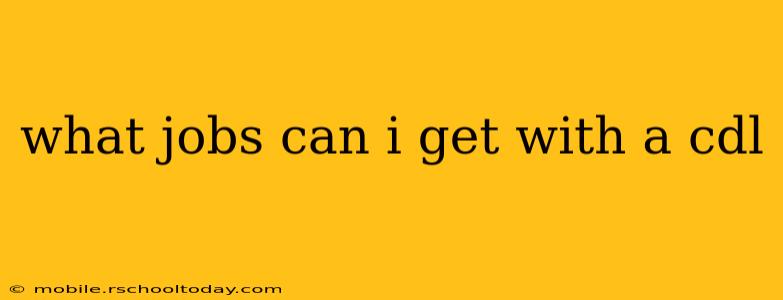What Jobs Can I Get with a CDL? A Comprehensive Guide to Commercial Driving Careers
A Commercial Driver's License (CDL) opens doors to a wide variety of jobs in the transportation industry. More than just driving trucks, a CDL provides access to diverse roles with varying levels of responsibility, pay, and required experience. This guide will explore the many career paths available with a CDL, answering frequently asked questions to help you find the perfect fit.
What are the different classes of CDL?
Before diving into specific jobs, it's crucial to understand the different CDL classes. The class of your CDL determines the type of vehicle you're permitted to operate. The most common classes are:
-
Class A: This is the most comprehensive class, allowing you to operate combination vehicles with a gross combination weight rating (GCWR) of 26,001 or more pounds, provided the GVWR of the towed vehicle is at least 10,001 pounds. Think semi-trucks hauling large trailers.
-
Class B: This class permits you to operate single vehicles with a GVWR of 26,001 or more pounds, or any combination of vehicles with a GCWR of 26,001 or more pounds where the towed vehicle has a GVWR of less than 10,001 pounds. Examples include large trucks like garbage trucks, cement mixers, and some buses.
-
Class C: This is for vehicles that do not fall under Class A or B, but still require a CDL due to carrying hazardous materials or a certain passenger capacity. This could include smaller delivery trucks, some buses, or vehicles transporting hazardous materials.
Different jobs will require specific CDL classes, and endorsements might be necessary for specialized tasks (more on that below).
What types of jobs can I get with a Class A CDL?
A Class A CDL is your ticket to some of the most in-demand trucking jobs:
-
Long-Haul Truck Driver: This classic trucking job involves transporting goods across long distances, often requiring you to be away from home for extended periods. Pay is generally competitive, but it comes with the challenges of being away from family and dealing with unpredictable schedules.
-
Regional Truck Driver: This offers a balance between long-haul and local driving. You'll typically cover a more limited geographic area, allowing for more regular home time.
-
Local Truck Driver: These roles primarily involve transporting goods within a specific region, often returning home daily or at least weekly. This can be a more stable option with better work-life balance.
-
Heavy Haul Driver: This specialized role involves transporting oversized or heavy loads, requiring specialized skills and training. The pay can be very good, but it demands a high level of expertise and caution.
-
Tanker Truck Driver: These drivers transport liquids, gases, or other bulk materials in specialized tankers. This often requires additional endorsements and rigorous safety training.
What jobs can I get with a Class B CDL?
A Class B CDL opens up different but equally important roles:
-
Bus Driver (Transit, School, Charter): Driving buses requires a strong sense of responsibility and excellent driving skills, as you're responsible for the safety of passengers.
-
Garbage Truck Driver: This role involves collecting waste and requires both physical strength and safe driving techniques in varied conditions.
-
Concrete Mixer Driver: Similar to garbage truck driving, this involves operating specialized vehicles, requiring careful maneuvering and awareness of the load's weight and distribution.
-
Delivery Truck Driver (Large Vehicles): Many delivery companies use larger trucks, requiring a Class B CDL.
What jobs can I get with a Class C CDL?
Even a Class C CDL can lead to several fulfilling careers:
-
Delivery Truck Driver (Smaller Vehicles): Many companies use smaller delivery trucks that require a Class C CDL.
-
Driver transporting hazardous materials: This job requires additional endorsements and specialized training.
What endorsements are needed for specific CDL jobs?
Certain CDL jobs require endorsements beyond the basic class. Common endorsements include:
- Hazmat (Hazardous Materials): Required for transporting hazardous materials.
- Passenger (P): Needed to drive vehicles carrying passengers.
- School Bus (S): Specifically for driving school buses.
- Tanker (N): Required for driving tanker trucks.
- Doubles/Triples (T): For operating vehicles with multiple trailers.
How much do CDL jobs pay?
The salary for CDL jobs varies greatly depending on factors like experience, location, company, and the type of driving job. While entry-level positions may offer lower pay, experienced drivers in high-demand areas can earn significantly more. Additionally, benefits like health insurance and retirement plans can increase overall compensation.
What are the benefits of having a CDL?
Beyond the job opportunities, a CDL offers several benefits:
- High demand: The trucking industry consistently faces a driver shortage, making CDL holders highly sought after.
- Good earning potential: Experienced drivers can earn a substantial income.
- Job variety: The industry offers a diverse range of jobs with various levels of responsibility.
- Opportunities for advancement: Many career paths exist within the trucking industry, allowing for growth and progression.
This comprehensive overview should help you navigate the numerous career options available with a Commercial Driver's License. Remember to research specific job requirements and consider factors like work-life balance, pay, and job satisfaction when making your decision.
